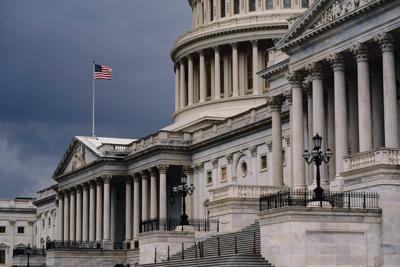WASHINGTON ŌĆö President Donald TrumpŌĆÖs big bill making its way through Congress will cut taxes by $3.75 trillion but also increase deficits by $2.4 trillion over the next decade, according to an analysis released Wednesday by the nonpartisan Congressional Budget Office.
The CBO also estimates an increase of 10.9 million people without health insurance under the bill by 2034, including 1.4 million who are in the United States without legal status in state-funded programs.
The package would reduce federal outlays, or spending, by nearly $1.3 trillion over that period, the budget office said.

The U.S. Capitol in Washington, Aug. 3, 2020.
ŌĆ£Republicans cry crocodile tears over the debt when Democrats are in charge ŌĆö but explode it when theyŌĆÖre in power,ŌĆØ said Rep. Brendan Boyle of Pennsylvania, the top Democrat on the House Budget Committee.
ŌĆ£In the words of Elon Musk,ŌĆØ Boyle said, reviving the billionaire former Trump aideŌĆÖs criticism of the package, ŌĆ£this bill is a ŌĆśdisgusting abomination.ŌĆÖŌĆØ
People are also reading…
Trump pushing Congress to act
The analysis comes at a crucial moment in the legislative process as Trump is pushing Congress to have the final product on his desk to sign into law by the Fourth of July. The work of the CBO, which for decades has served as the official scorekeeper of legislation in Congress, will be weighed by lawmakers and others seeking to understand the budgetary impacts of the sprawling 1,000-page-plus package.
Ahead of the CBOŌĆÖs release, the White House and Republican leaders criticized the budget office in a preemptive campaign designed to sow doubt in its findings.
Republicans criticize the CBO
White House press secretary Karoline Leavitt said the CBO has been ŌĆ£historically wrong,ŌĆØ and Senate Majority Leader John Thune said the CBO was ŌĆ£flat wrongŌĆØ because it underestimated the potential revenue growth from TrumpŌĆÖs first round of tax breaks in 2017. The CBO last year said receipts were $1.5 trillion, or 5.6% greater than predicted, in large part because of the ŌĆ£burst of inflationŌĆØ during the COVID-19 pandemic in 2021.
Leavitt also suggested that the CBOŌĆÖs employees are biased, even though certain budget office workers face strict ethical rules ŌĆö including restrictions on campaign donations and political activity ŌĆö to ensure objectivity and impartiality.
ŌĆ£When it comes time to make prognostications on economic growth, theyŌĆÖve always been wrong,ŌĆØ House Majority Leader Steve Scalise, R-La., said at a press conference.
Asked later if itŌĆÖs time to get rid of the CBO, Scalise did not dismiss the idea. ŌĆ£I think itŌĆÖs very valid to raise these concerns that CBO has missed the problems that come with making false estimates,ŌĆØ Scalise said. ŌĆ£Economic growth has been their Achilles' heel.ŌĆØ
Alongside the costs of the bill, the CBO had previously estimated that nearly 4 million fewer people would have food stamps each month due to the legislationŌĆÖs proposed changes to the Supplemental Nutrition Assistance Program, known as SNAP.
What's in the bill
The bill, called the One Big Beautiful Bill Act after the presidentŌĆÖs own catch phrase, is grinding its way through Congress, as the top priority of Republicans, who control both the House and the Senate ŌĆö and face stiff opposition from Democrats at every step in the process.
Democrats call it TrumpŌĆÖs ŌĆ£big, ugly bill.ŌĆØ
All told, the package seeks to extend the individual income tax breaks that had been approved in 2017 but that will expire in December if Congress fails to act, while adding new ones, including no taxes on tips. It also includes a massive buildup of $350 billion for border security, deportations and national security.
To help cover the lost revenue, Republicans want to slash some federal spending. They propose phasing out green energy tax breaks put in place during Democrat Joe Biden's presidency. New work requirements for some adults up to age 65 on Medicaid and SNAP would begin in December 2026 and are expected to result in less spending on those programs.
The package also would provide a $4 trillion increase to the nationŌĆÖs debt limit, which is now $36 trillion, to allow more borrowing. The Treasury Department projects the debt limit will need to be raised this summer to pay the nationŌĆÖs already accrued bills.
CBO aims for impartiality
Now in its 50th year, the CBO was established by law after Congress sought to assert its control, as outlined in the Constitution, over the budget process, in part by setting up the new office as an alternative to the White HouseŌĆÖs Office of Management and Budget.
Staffed by some 275 economists, analysts and other employees, the CBO says it seeks to provide Congress with objective, impartial information about budgetary and economic issues.
Its current director, Phillip Swagel, a former Treasury official in Republican President George W. BushŌĆÖs administration, was reappointed to a four-year term in 2023.




















